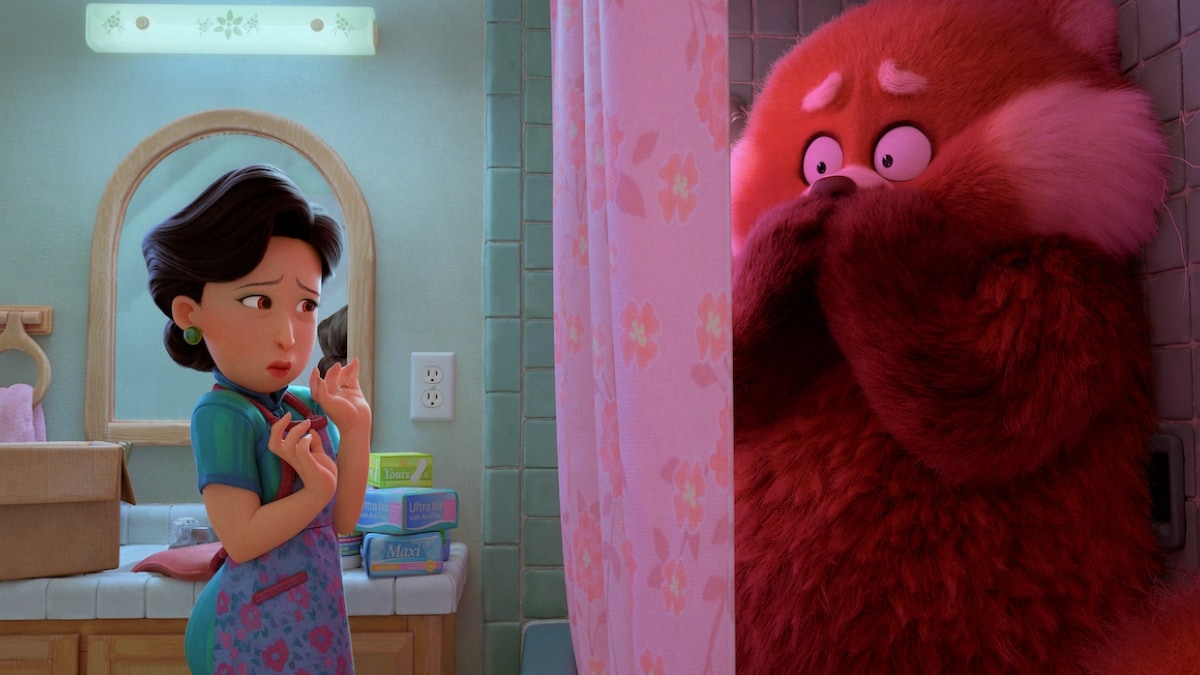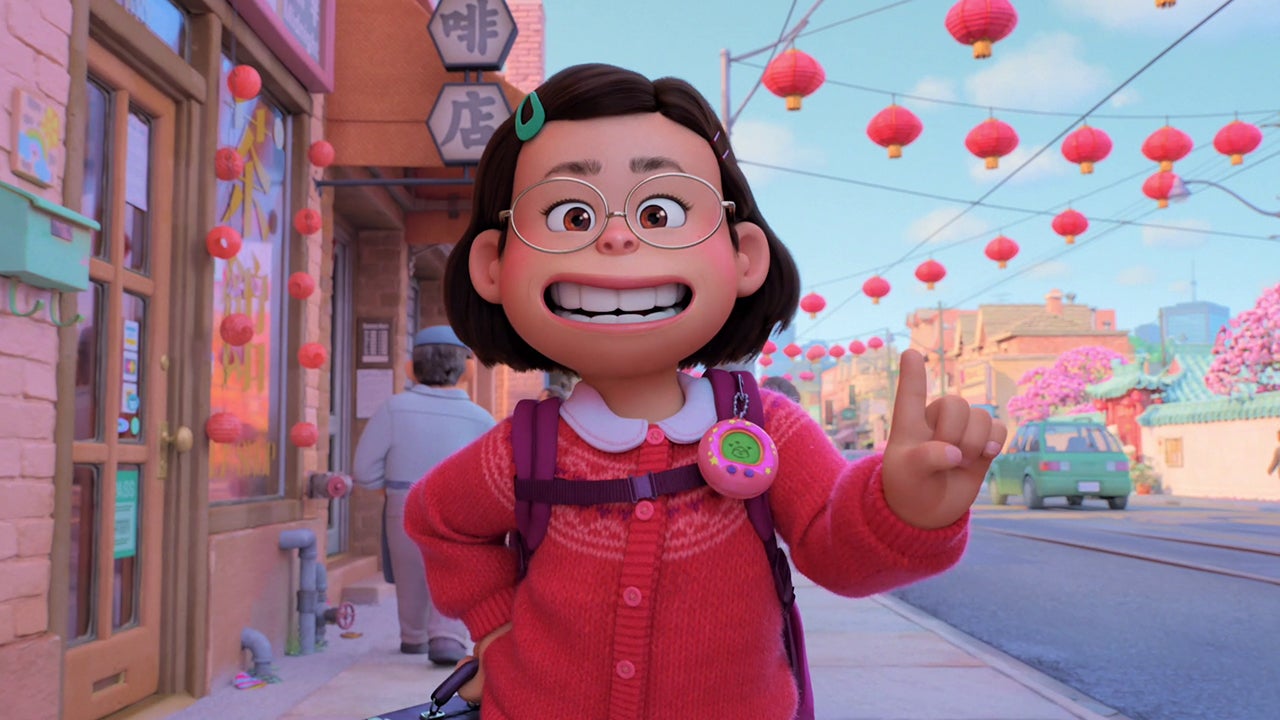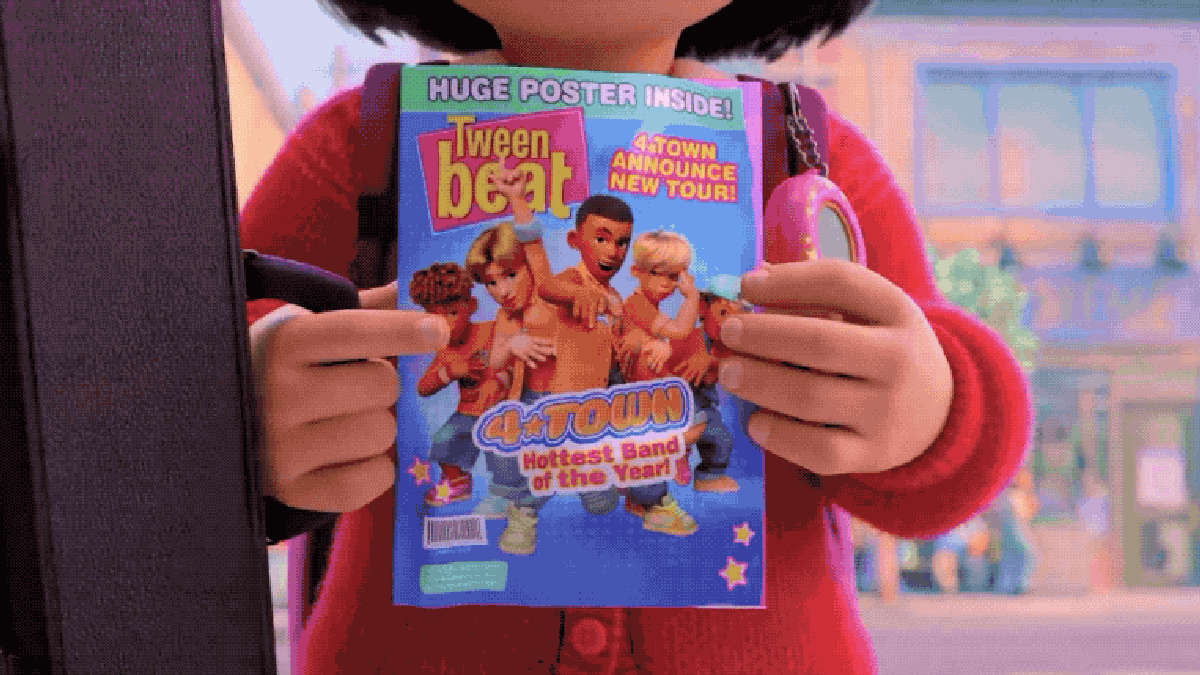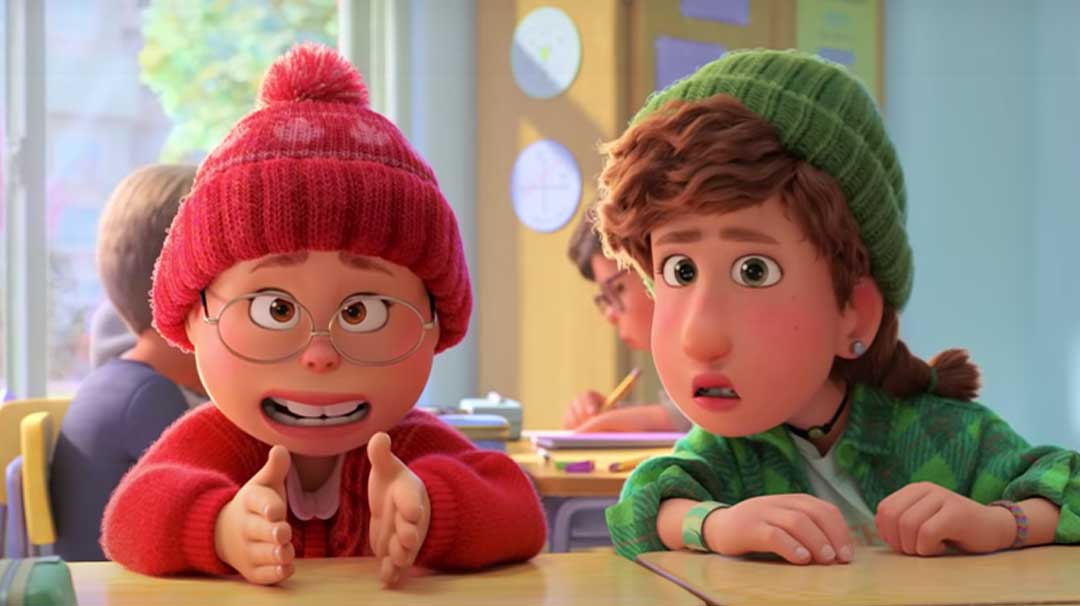by Lynn Lee
 All images in this post are from Turning Red © Disney/Pixar
All images in this post are from Turning Red © Disney/Pixar
Here are some things I never thought I’d see in a Disney animated movie:
-unleashed adolescent female desire, front and center (here metaphorically represented by a red panda)
-matter-of-fact references to menstruation (even though it’s also metaphorically represented, or rather superseded, by the red panda)
-a boy band and Tamagotchis (remember those?) as major plot drivers...
All of the above appear in Turning Red, the debut feature film of Domee Shi, who first made a splash with her wonderful Oscar-winning Pixar animated short Bao. If you’re thinking this doesn’t sound like a movie for you, think again. First, check your biases. Second, if you actually watch the movie, you may be surprised to find yourself caring intensely about all the things on my list – yes, even the Tamagotchis.
You may notice I didn’t include, on that list, “Asian [North] American protagonist,” although it wasn’t so long ago I would have done so. Happily, Asian diaspora representation in American film has come a long way in the last several years, even if it’s still got a ways to go. After Bao, giving Shi a huge platform for what’s essentially a fantastical animated riff on her own adolescence feels more like a satisfying evolution than a revolution. However, it’s what she did with it – how she made a Disney film that’s at once deeply idiosyncratic, intensely personal, yet broadly accessible – that feels revolutionary. I still can’t quite believe she got away with it. (Then again, I still can’t quite believe she got away with Bao, either.)

The premise is simple enough. 13-year-old Mei-Lin (Rosalie Chiang), a bright, energetic Chinese Canadian girl in Toronto circa 2002 (yes, the movie is that specific about its setting), prides herself on her ability to balance the demands of school, her loving but controlling and overprotective mother (Sandra Oh, terrific as always), and her loyal posse of BFFs. Then she hits puberty, throwing that balance off-kilter as her hormones and emotions go into overdrive. So far, so normal – except in Mei’s case, when her feelings overwhelm her, she magically transforms into a giant red panda. When she calms down, she reverts to human form, albeit with newly fiery red hair.
At first Mei is mortified by her spontaneous pandagenesis, especially when her mother reveals it’s a hereditary trait passed down through the women of their family, and one that must be extracted through a special ceremony. Her friends, on the other hand, find her panda super cool and encourage her to let it out to play. The rest of the film turns on that tension and how Mei resolves it, even if the surface narrative is ostensibly and more prosaicly about whether she and her friends can get into a concert by a megapopular boy band without Mei’s mom finding out.
You can guess how this ends, though I defy you to foresee exactly how surreally it plays out. At the movie’s climax, my husband turned to me and said “I have no idea what we’re watching,” and I responded that it might make perfect sense if we were either anime or kaiju fans – or even boy band fans. As it is, the film at times feels a little too frenetic, too crammed with disparate themes, tones, and influences that threaten to overstrain the somewhat thin plot. But it’s never less than entertaining, and its emotional core remains solid and true. The struggle of a devoted Asian mom to let go of her child recalls Bao, only here Shi layers in the peculiar codependency of the Asian mother-daughter relationship and the paralyzing fear of disappointing one’s mother. (See also The Joy Luck Club.) It’s effective, as evidenced by how much I sniffled when Mei and her mom finally reconcile and recalibrate their relationship, though admittedly as the only daughter of a textbook tiger mom, I am the target audience for this stuff.

While the animation is generally serviceable rather than dazzling, there’s something charming about how painstakingly it recreates the world of a Chinese Canadian teenage girl in Toronto of the early aughts. Shi’s affection for that period of her life is palpable in the frequent shots of the CN Tower, the delicious Chinese meals lovingly prepared by her parents (especially her dad, in a cooking scene as mouth-watering as anything in Bao), and the flip-phones, Discmans, camcorders, and magazines the teen characters brandish in scene after scene, blissfully oblivious that some day all those items will be replaced by a single handheld device. 4Town, the band Mei and her pals are obsessed with, looks like a mash-up of the boy-bands of yesteryear and the K-pop bands of today, but their songs – brilliant concoctions from Billie Eilish and Finneas O’Connell – sound like lost tracks from an N Sync album. (Side note: you know you’re getting old when the generation below you is waxing full-on nostalgic for their formative years.)
Some viewers may complain – including some who should know better – that Turning Red’s setting and concerns are too narrowly scoped to be relatable. I couldn’t disagree more. I’ve always championed the opposite proposition: This kind of cultural specificity only strengthens a movie’s ability to appeal more broadly, because it feels just that much richer, more real, and more personal. The details that make a protagonist’s experience different from a viewer’s only highlight the emotions, desires, and fears they have in common.
Shi’s film, for example, explores the dizzying swings of adolescence between horniness and shame, the incalculable value of friends who really have your back, and the difficulties of negotiating boundaries and expectations with a parent. It doesn’t get much more universal than that. In fact, I could just as easily have been describing Lady Bird, and as it happens the two films have a lot of striking similarities – from the time frame right down to the dynamic between daughter, mother, and kind but conflict-avoidant father (here voiced by Orion Lee). Which only underscores my larger point: If you tell the story you know, and can evoke how it made you feel, it can resonate with any audience. I’m confident Turning Red will do just that.
